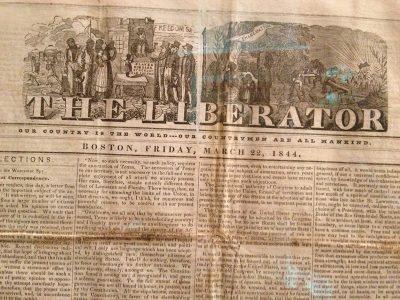Traditionally, academia and journalism could be considered separate sectors. “The Emancipator,” a new joint venture between Boston University’s Center for Antiracist Research and The Boston Globe’s Opinion team, challenges that convention as they work to reshape the dialogue around racial justice nationwide.

The project, founded by BUCAR founder and director Ibram X. Kendi and Boston Globe editorial page editor Bina Venkataraman, will be a revival of the spirit of 19th-century anti-slavery publications, including William Lloyd Garrison’s The Liberator in Boston, the first abolitionist paper in the country.
The name comes from an 1820 anti-slavery periodical, the first of its kind, Kendi said in the announcement video released last week.
Kimberly Atkins, a BU School of Law and College of Communication alumna and senior opinion writer at the Globe, is the inaugural columnist for The Emancipator and the author of the project’s newsletter “Unbound.”
Atkins said in an interview The Emancipator aims to reenvison 19th century anti-slavery publications for current-day audiences to inspire change and examine “the structural inequities in a host of systems in America.”
The modern conversation around racial justice needs to progress, she said, just as past media outlets pushed national dialogue to change during and after the Civil War.
“In those newspapers, it was a place for thought leaders, for journalists, for members of those communities to really push the envelope and have a broader way of thinking about what freedom meant,” Atkins said. “It wasn’t just the end of slavery, but what would happen to Black people in America.”
Monica Wang, the associate director of narrative at BUCAR and an associate professor at BU’s School of Public Health, serves as a founding editorial member of The Emancipator. She said the collaboration connects university scholars and communication leaders to create meaningful impact in Boston and beyond.
“This is a multimedia platform that will be housed at a microsite at the Globe, and the platform is really meant to reframe the national conversation on race and equity,” Wang said, “so that it embodies and essentially integrates scholarship as well as journalism.”
She said The Emancipator will include the bi-weekly newsletter as well “cutting edge” knowledge and evidence-based data on anti-racism to inform readers.
“What we really want to do is engage the public and help shape national dialogue around new solutions, expert insights on current events and ways moving forward to build a more just and equitable society,” she said.
Atkins, who writes the newsletter, said she sees it as a “valuable tool” to not only share the project’s work, but contextualize current news.
“The newsletter is a way to sort of create … whether it’s the annotated abolitionists essays from the 19th century, whether it’s the columns and reporting that the writers are doing, whether it’s the observation of the scholars,” Atkins said, “and bring that into perspective and deliver it right to people’s inboxes.”
As the inaugural columnist, Atkins said she would be writing columns for The Emancipator that will also be published on The Boston Globe’s website. In the coming weeks, she said she will be writing a series about systemic racism and potential solutions.
“There’s a lot about this project that I will be involved in that I’m very excited about,” Atkins said.
The Emancipator is currently recruiting for two co-editor-in-chiefs, one for BU and one for The Boston Globe. The two juxtaposed positions should “reflect a true, equal partnership between media and between academia,” Wang said.
“To me, this is really exciting because it is going outside of academia to create partnerships and collaborations with other sects,” she said. “When we do that, I think we get to see more innovation, see more creativity and also encourage and catalyze more interdisciplinary thinking and perspective.”
As a public health expert, Wang said she works on addressing health disparities based on racial and socioeconomic status — focuses that have connected her to The Emancipator and its mission.
“In the work that I do with communities of color, stories and storytelling are a really powerful way to empower communities and advocate and catalyze change,” Wang said. “The work of The Emancipator very much embodies the spirit of doing that kind of communication and engaging in public scholarship.”
The Emancipator is run by experts and scholars from diverse fields of study and areas of research, which Wang said will allow the publication to develop innovative ideas.
“When people bring different training backgrounds and different lenses, it encourages us to think outside the box,” she said, “and to really harness our collective expertise and come up with new project ideas.”
The multimedia microsite is set to launch this summer.
Atkins said BU students can become more involved “by reading and engaging” with the material.
Wang said once The Emancipator officially launches, the team hopes to partner with the College of Communication to recruit student journalists to be involved, as well as develop a Fall course on racial reporting, which she said is another priority of the project.
“We not only want to amplify voices and amplify research,” she said, “but we also want to train the next generation of scholars to engage in this work as well.”



























































































































